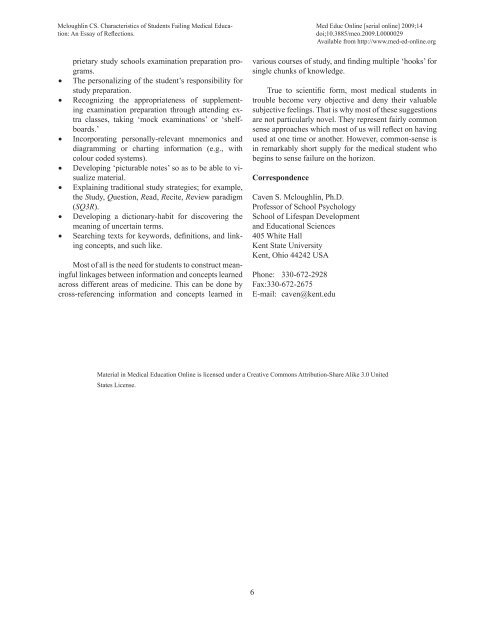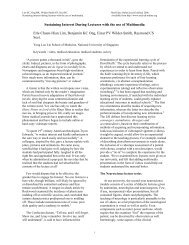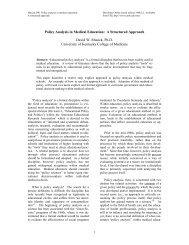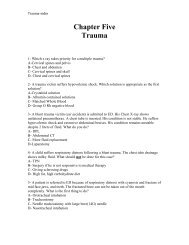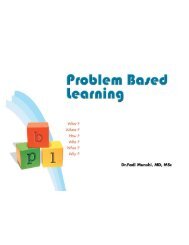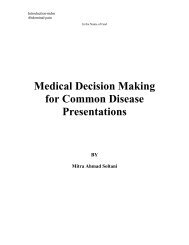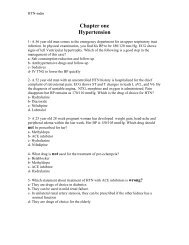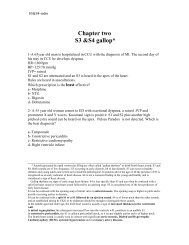Characteristics of Students Failing Medical Education: An Essay of ...
Characteristics of Students Failing Medical Education: An Essay of ...
Characteristics of Students Failing Medical Education: An Essay of ...
Create successful ePaper yourself
Turn your PDF publications into a flip-book with our unique Google optimized e-Paper software.
Mcloughlin CS. <strong>Characteristics</strong> <strong>of</strong> <strong>Students</strong> <strong>Failing</strong> <strong>Medical</strong> <strong>Education</strong>:<br />
<strong>An</strong> <strong>Essay</strong> <strong>of</strong> Reflections.<br />
prietary study schools examination preparation programs.<br />
• The personalizing <strong>of</strong> the student’s responsibility for<br />
study preparation.<br />
• Recognizing the appropriateness <strong>of</strong> supplementing<br />
examination preparation through attending extra<br />
classes, taking ‘mock examinations’ or ‘shelfboards.’<br />
• Incorporating personally-relevant mnemonics and<br />
diagramming or charting information (e.g., with<br />
colour coded systems).<br />
• Developing ‘picturable notes’ so as to be able to visualize<br />
material.<br />
• Explaining traditional study strategies; for example,<br />
the Study, Question, Read, Recite, Review paradigm<br />
(SQ3R).<br />
• Developing a dictionary-habit for discovering the<br />
meaning <strong>of</strong> uncertain terms.<br />
• Searching texts for keywords, definitions, and linking<br />
concepts, and such like.<br />
Most <strong>of</strong> all is the need for students to construct meaningful<br />
linkages between information and concepts learned<br />
across different areas <strong>of</strong> medicine. This can be done by<br />
cross-referencing information and concepts learned in<br />
various courses <strong>of</strong> study, and finding multiple ‘hooks’ for<br />
single chunks <strong>of</strong> knowledge.<br />
True to scientific form, most medical students in<br />
trouble become very objective and deny their valuable<br />
subjective feelings. That is why most <strong>of</strong> these suggestions<br />
are not particularly novel. They represent fairly common<br />
sense approaches which most <strong>of</strong> us will reflect on having<br />
used at one time or another. However, common-sense is<br />
in remarkably short supply for the medical student who<br />
begins to sense failure on the horizon.<br />
Correspondence<br />
Caven S. Mcloughlin, Ph.D.<br />
Pr<strong>of</strong>essor <strong>of</strong> School Psychology<br />
School <strong>of</strong> Lifespan Development<br />
and <strong>Education</strong>al Sciences<br />
405 White Hall<br />
Kent State University<br />
Kent, Ohio 44242 USA<br />
Phone: 330-672-2928<br />
Fax: 330-672-2675<br />
E-mail: caven@kent.edu<br />
Med Educ Online [serial online] 2009;14<br />
doi;10.3885/meo.2009.L0000029<br />
Available from http://www.med-ed-online.org<br />
Material in <strong>Medical</strong> <strong>Education</strong> Online is licensed under a Creative Commons Attribution-Share Alike 3.0 United<br />
States License.<br />
6


